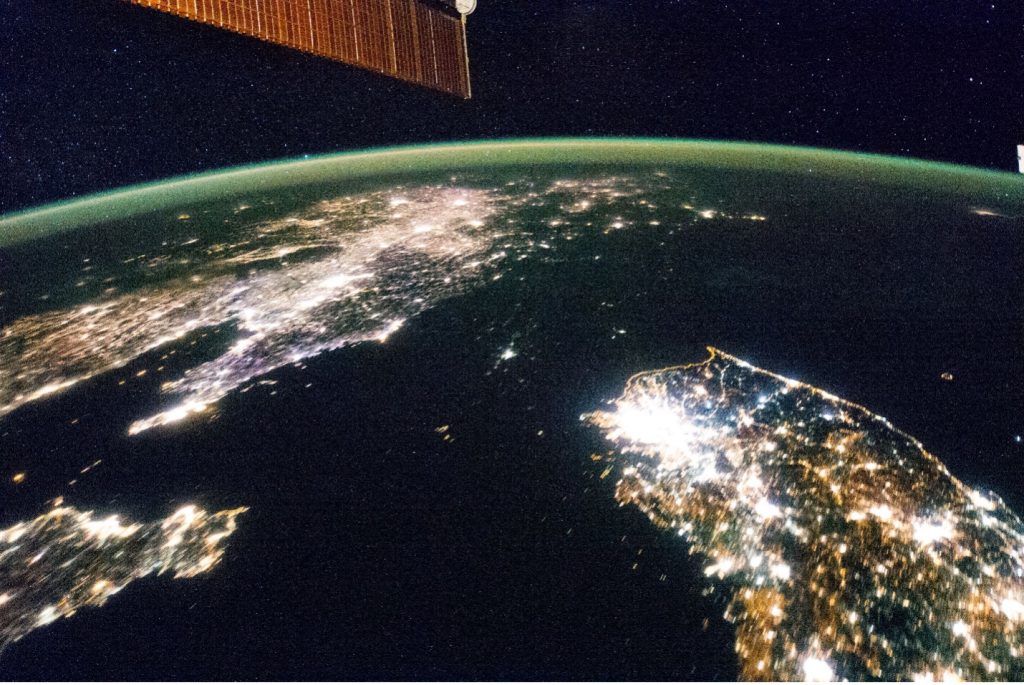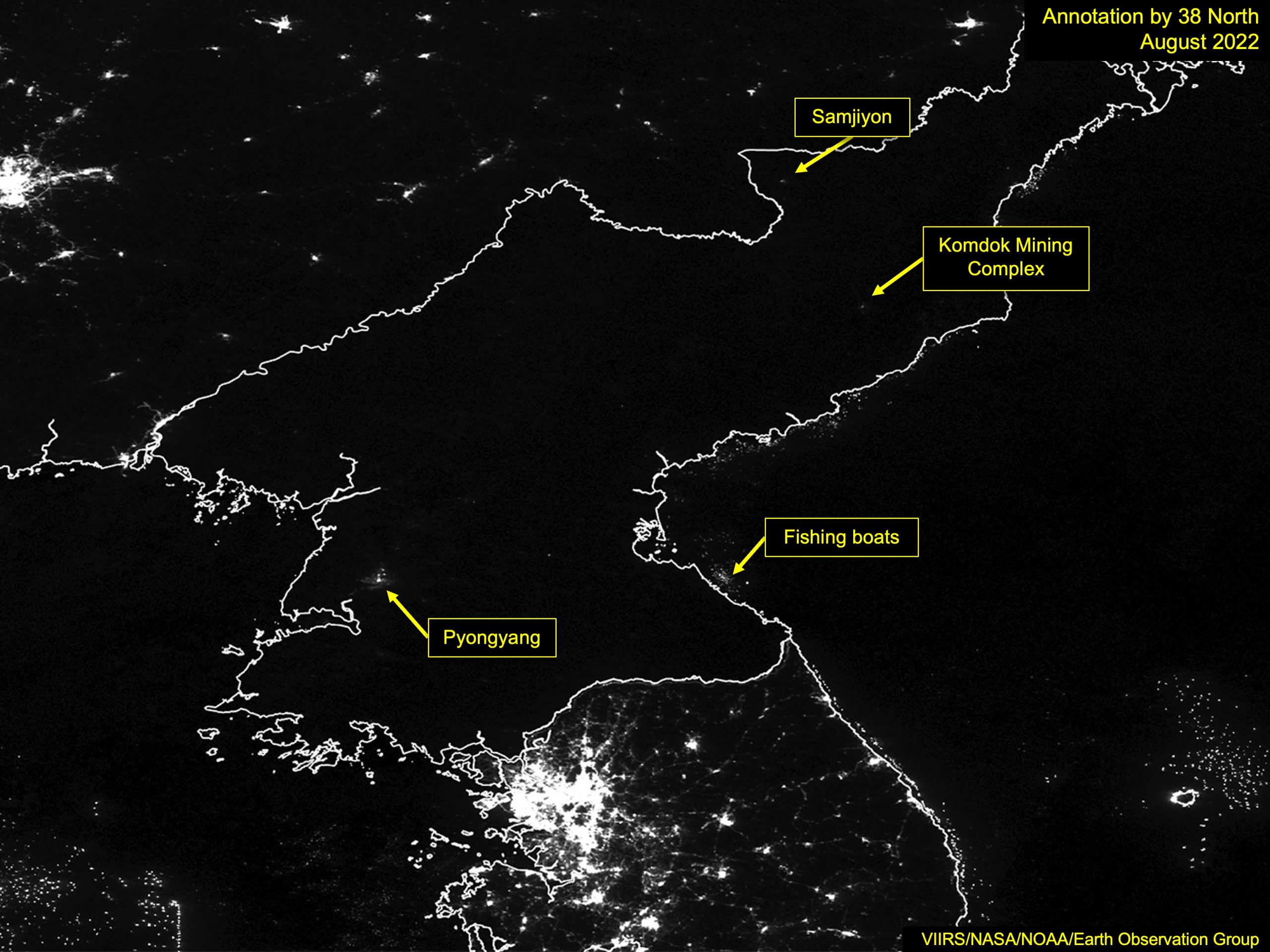I saw a NYT article today that just felt the need to link to this image of the DPRK as a means of pointing out the failings of socialist states (in a totally unrelated article, not surprising). I know that they're not providing the context both current and historical for why there is this disparity between the two Koreas, but I lack the knowledge or resources to effectively combat this blatant propaganda.


I know this photo has been around for a while, and I figured there might already be some myth-busting written somewhere I'm not aware of.
The obvious implication from this photo is:
![]()
![]() "Socialism is when No Electricity".
"Socialism is when No Electricity". ![]()
all the light shooting off into space is waste, so when you're not lighting up a fuckload of billboards and you design your street lights efficiently there won't be so much light pollution.
there's a bunch of rural poverty of course but it's dishonest to talk about that without talking about the trade embargo
all the light shooting off into space is waste, so when you're not lighting up a fuckload of billboards and you design your street lights efficiently there won't be so much light pollution.
Yes, but it's not like the DPRK has figured out some amazing solution to block most light pollution that no other country, not even China, has access to.
not having billboards lit up all night is probably worth a lot. I'd imagine they also don't keep the lights on in office towers either.
it certainly doesn't explain all of it but idk we don't really have pictures like this of anywhere else from, say, the 1950s
This is a good analysis that isn't even a "debunking" of the photo, which is fine. It's a great illustration of why you need to be critical of such images. This photo is apparently included in the standard US DoD briefings on North Korea, and it was mentioned in a news briefing in 2002 by Rumsfeld, who was the Defense Secretary at the time, and he is quoted as saying:
If you look at a picture from the sky of the Korean Peninsula at night, South Korea is filled with lights and energy and vitality and a booming economy; North Korea is dark.
It's clearly a politically motivated image, and should be viewed critically. Without knowing the parameters of how the image was created, such as the number of orbits taken to capture it, you can't say for sure it's an image taken in good faith.
Her point about electrical consumption and its relation to colonialism is also strong. It allows you to draw a line between all these nations and attempt to form some conclusion about why their consumption lower than the west, and ask "could this be why there are fewer bright light sources in the DPRK?"
Her point about electrical consumption and its relation to colonialism is also strong
Yeah, and we see this throughout the history of colonialism and imperialism in more modern times - the countries under the most significant embargoes are Iran, Cuba, and The DPRK (off the top of my head).
Energy fuels production. There's no way around that. Production drives development (except when it's purely extractive production, such as Cuba under Batista etc.)
One of the best ways to kick away the ladder is by controlling energy supply to a country. The DPRK has little to no oil supply domestically. Even in countries that do have a major source of oil & gas like Venezuela, the quality of their oil is poor for reasons I'm not going to bore you with and so their refineries require higher quality oil products to turn their domestic oil into usable products, which is why the US started blocking oil imports to Venezuela and (shockingly) there have been a few sabotage attempts on Venezuelan oil refineries in the Maduro era. Also afaik the Venezuelan oil refineries were built to US spec because it was originally a site of US oil imperialism before being nationalised and the US has gone to serious lengths to prevent the supply of parts to Venezuelan refineries, from memory.
This is not unlike the fear mongering over Iran's "nuclear weapons program". I'm in favour of them getting nukes for very obvious reasons but that aside, Iran has been attempting to create a domestically-developed nuclear energy program and Mossad has been acting as the perennial US lapdog by carrying out assassinations of nuclear scientists and technicians who are critical to these efforts while from behind the scenes the US has been keeping its hands mostly clean by using cyberwarfare to conduct sabotage operations. (It's only when significant threats to ISIS that it seems like the US will directly sully its hands and engage in assassinations, e.g. General Qassam Soleimani.)
Iran has historically been pretty open with the UN atomic energy regulatory and inspection body however there's serious suspicion that the US and Pissrael are leveraging the surveillance and intelligence gathering via inspections etc. to coordinate sabotage efforts. Whether this is true or not I cannot attest to the fact but it's no exercise in my imaginatory capacity to consider the prospect of Mossad having nuclear inspectors on the payroll, y'know?
All of this because if you have a so-called rogue state who has energy sovereignty they are capable of meeting the needs of their people and developing themselves to near-peer status economically and militarily.
Russia has energy sovereignty. China has established itself firmly within the international economic order and so they enjoy the privilege of being able to exercise autonomy over thei energy imports. That's already two too many for the US' tastes.
The US cannot tolerate any challenge to its dominance and so it seeks to cripple any rivals - on the soft end of things they enforce poisoned chalice economic policy, with the most obvious examples being the Japanese economy when it threatened to eclipse the US economy going back a few decades, the EU with Russian gas imports especially - it should come as no surprise that the US escalated the situation in Eastern Europe and has just somehow stumbled into causing an energy crisis for Germany to knock them, as the economic centre of the EU, down a peg. Of course the most vulgar examples are the World Bank and the IMF in developing nations - gee, I wonder why Pakistan is pursuing its economic demise at the hands of the IMF right now while Imran Khan's political agenda has been somewhat curtailed by the powers that be? 🤔🤔 Almost like they want to ensure that even if he gets into power again, which is a significant possibility despite the other major political forces in the country unifying against the threat he poses, that he will have an economic shitstorm to weather, especially given that the IMF will be given mandate to conduct low-level economic warfare against Pakistan if it happens to stray too far from US interests. Of course Chinese economic diplomacy is a bit of a wildcard in this situation so it will be interesting to see what develops.
The DPRK suffers under strict conditions for its energy and so it dedicates its scarce energy supply to the highest priorities - agriculture, defence, and economic production so they aren't pissing away energy with light pollution. Shocking, right?
There was sanctions levied against the DPRK in recent years by the UN Security Council. The US pushed for such tight restrictions on energy imports that China vetoed the original proposal on the grounds that it would essentially cause the collapse of the DPRK. If that doesn't tell you everything about how the US uses energy as one of its primary non-military tools for imperialism, I don't know what would.
(Disclaimer that all of this comment has been me just emptying my brain of thoughts that have been rattling around in my skull. None of it has been fact checked to ensure that it's perfectly accurate, hence why I haven't been specific about years and my statements have been a bit vague with regard to numbers so take all this as opinion and not as essay which has accurate sources.)
I found a YouTube link in your comment. Here are links to the same video on alternative frontends that protect your privacy:
She explained how the images are created, but she provided no evidence (or explicit claim) that North Korea specifically was altered.
https://imgur.com/a/PSIKyuK here is a different satellite image of North Korea at night
An Imgur link was detected in your comment. Here are links to the same location on alternative frontends that protect your privacy.
Hm, my impression in the past is that the DPRK was darker at night due to a combination of the lack of energy in the 90s and it's consequences today and that these "light at night" images are things created by hand and not actually the result of just simply taking a screenshot of earth or whatever.
However, your still is from footage; I watched that footage and yeah in a seemingly real time video captured by a satellite the DPRK still appears largely dark, dwarfed even by fishing boats and small stuff like the Sakhalin islands. Cuba, even, is just as bright as anywhere else.
The only conclusion I can come to is that it's perhaps true and real; I think theorizing about how every frame was doctored in a video to make the DPRK darker is simply a conspiracy. However, Cuba, another socialist country under embargo, has a population of roughly 13 million; while the DPRK has a population of 26m. If Cuba is far brighter while being under similar conditions with half the population, then the darkness may be intentional?
Perhaps there's more strict regulations for light fixtures and energy use as a remnant of the 90s era, perhaps they don't light the roads in the same way, who's to say? I don't remember any billboards in Cuba so it can't just be from a lack of Billboards. It'd make sense if power just isn't being used as efficiently in Cuba; due to the difficulty of getting construction materials in a lot of things are pretty laissez faire over there in regards to standards. Perhaps the same issue doesn't exist in the DPRK and they're able to have better regulations on these things.
In addition, India itself shows how this may not be a useful heuristic; India shines incredibly brightly but living conditions for the vast majority of people are still incredibly impoverished. I'm genuinely not clear in quality of life etc in India, and I know it varies wildly from state to state, but I also know that the class divide is still brutal there no matter how much light is leaking into space.




